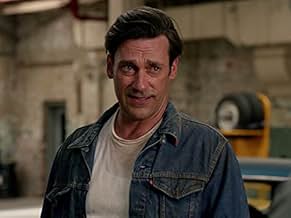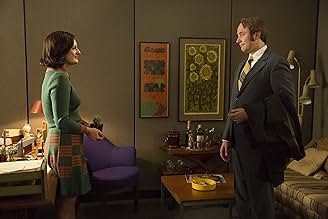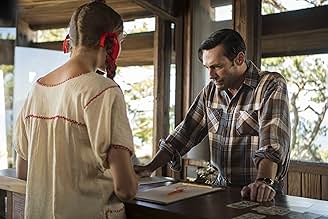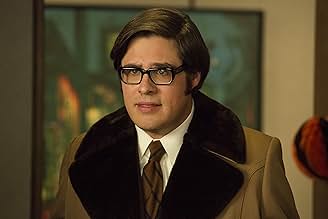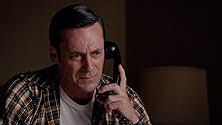यह सीरीज़ 1960 की शुरुआत में न्यूयॉर्क की सबसे प्रतिष्ठित विज्ञापन एजेंसियों के सबसे रहस्यमय और बेहद प्रतिभाशाली विज्ञापन अधिकारी, डोनाल्ड ड्रेपर की ज़िन्दगी पर केंद्रित है.यह सीरीज़ 1960 की शुरुआत में न्यूयॉर्क की सबसे प्रतिष्ठित विज्ञापन एजेंसियों के सबसे रहस्यमय और बेहद प्रतिभाशाली विज्ञापन अधिकारी, डोनाल्ड ड्रेपर की ज़िन्दगी पर केंद्रित है.यह सीरीज़ 1960 की शुरुआत में न्यूयॉर्क की सबसे प्रतिष्ठित विज्ञापन एजेंसियों के सबसे रहस्यमय और बेहद प्रतिभाशाली विज्ञापन अधिकारी, डोनाल्ड ड्रेपर की ज़िन्दगी पर केंद्रित है.
- 16 प्राइमटाइम एमी जीते
- 166 जीत और कुल 450 नामांकन
एपिसोड ब्राउज़ करें
सारांश
Reviewers say 'Mad Men' is lauded for its deep character studies, historical accuracy, and nuanced depiction of the 1960s, focusing on the advertising industry. The show delves into themes of identity, power, and societal change, with standout performances, especially Jon Hamm as Don Draper. Its meticulous period detail receives high praise. However, some viewers critique the slow pacing, repetitive storylines, and occasional frustration with character exits and unresolved plotlines.
फ़ीचर्ड समीक्षाएं
Mad Men is one of the best-written and most ambitious TV shows in some time. It is worth close study, not just for learning how to create a well-structured show but also how to write one that is truly original and potentially groundbreaking. Story world, or arena, is one of the key structural elements in any TV drama (see the TV Drama Class for how to create this element, as well as the other essential structural elements of a successful show). It is where the story takes place and it usually exists within some specific arena that not only delineates a recognizable unit but also has a set of rules, activities and values that defines the characters. One of the strengths of Mad Men is its story world. Instead of the usual arena of cops, lawyers, or doctors, Mad Men takes us into a Manhattan advertising agency in 1960. Besides being totally unique in TV, this story world is extremely detailed. And the detailing isn't simply a matter of the set design, which is fabulous. It is written into every episode. The writers weave all manner of cultural icons of the late 50s-early 60s, including TV shows, ads, and fashion. This has two great advantages. One is the pleasure of recognition. If you were a kid at that time, as I was, the show is a virtual time machine. And even if you weren't, the authenticity and texture immerse you in the world and make you feel that "You are there!" The other great advantage is that this past world tricks the audience into believing that this is how it really was back then. The first thing we notice when we see all of these details is how much the world has changed. Everybody smoked back then. The men were in charge and the women were all secretaries and housewives. That sets up the kicker. By first thinking how much we've changed, we then realize, with even more impact, all the ways we haven't. This story, set in 1960, is really about today, or more exactly, the ways that human nature only puts on a new skin and the same fundamental challenges of creating a meaningful life must be faced by each of us, every moment of every day. Another structural element that immediately jumps out at you if you want to create a TV show or write for one is the desire line. In Mad Men the desire that structures each episode is fairly nebulous, and that's probably going to cut into the show's popularity (I hope I'm wrong on this one). Desire is the main reason almost all TV shows are set in the cop, lawyer, and doctor arenas. These jobs give their shows a simple and repeatable desire line that tracks the episode every week. Catch the criminal. Win the case. Save the life. But of course this is extremely limiting. Most people don't spend their daily lives solving crimes, prosecuting bad guys, and saving lives. So while the desire line on this show may be more nebulous, it is far closer to what most Americans do in their daily lives. These Mad Men are in the business of selling, which, as Arthur Miller pointed out long ago, is the archetypal American action. But they aren't selling a particular product. They're selling desire, some image of the good life that, because it is a fabricated ideal, is always just out of reach. Writer Matthew Weiner's brilliant conception for this show is to connect the selling of desire to America to the personal and work lives of the ad men themselves. The ad men want the image of the good life in America that they are selling to be true, even if they intellectually make fun of the poor suckers out there who buy it. Main character Don Draper is handsome and talented, with a beautiful wife and two cute little kids. But he has some secrets he's keeping like a mistress in the city and he feels a terrible void he has no idea how to shake. Draper is a master at manipulating desire and creating facades, so when he tries to live the promise for real, the "good life" falls apart in his hands. We are in Far from Heaven and American Beauty territory here. And the second episode even had Draper give his own version of the Existentialist credo of Sartre and Camus that was seeping into pop culture during the late 50s (how's that for a sweet detail on a TV show?). We'll have to see whether Mad Men can extend beyond a few episodes without imploding. Besides the lack of a clean desire line, the subject of hollow suburban existence will make it extremely difficult for the writers to develop the show over the long term without beating a spiritually dead horse. In the meantime, I'm going to sit back and enjoy some great dramatic writing, and nowadays TV is the only place you'll find it.
10alexnapo
When I started watching Mad Men, the rhythm of it felt slow.
Pretty quickly did I realize how much more powerful the slow story & plot development rhythm would be, allowing us to discover the characters, mostly in seasons 1 and 2, and then really be in the thick of it in subsequent seasons.
Indeed, this series has pushed character development so far that they are the entire and only reason why this series is interesting. The actual events happening at the advertising agency is a pretext to throw more things at those characters and have them deal with it. In fact, the characters are so interesting that there is practically no violence needed (except a few minor events) over 7 seasons to keep this series going. I find that tremendously respectable to be able to craft a series in this way, not using gun shots and bombs to make it lively.
Finally, I have not lived in the early 60's time period the series is set in, but I can only say that it's all seemed to me very interesting and all these "vintinge" props and costumes, hair style and such made it all the more fascinating to watch.
Absolutely great work.
Pretty quickly did I realize how much more powerful the slow story & plot development rhythm would be, allowing us to discover the characters, mostly in seasons 1 and 2, and then really be in the thick of it in subsequent seasons.
Indeed, this series has pushed character development so far that they are the entire and only reason why this series is interesting. The actual events happening at the advertising agency is a pretext to throw more things at those characters and have them deal with it. In fact, the characters are so interesting that there is practically no violence needed (except a few minor events) over 7 seasons to keep this series going. I find that tremendously respectable to be able to craft a series in this way, not using gun shots and bombs to make it lively.
Finally, I have not lived in the early 60's time period the series is set in, but I can only say that it's all seemed to me very interesting and all these "vintinge" props and costumes, hair style and such made it all the more fascinating to watch.
Absolutely great work.
I'll be the first to admit that Mad Men is a show about watching people go to work and live their lives. It should be dull and uninteresting, yet somehow it managed to grip me for a whole 7 seasons and left me wanting more.
The setting is a big part of it. The historical interest of the time (JFK's assassination, the moon landing, England winning the World Cup, to name a few key points in the show) is enough to keep many gripped. It's more than that though. The characters in themselves are worth following and you get invested in them as the seasons progress.
To be frank I didn't like the first season. I just didn't get the formula and was getting close to giving up on the show. I'm glad I didn't though as it only improves from the second season onward.
The setting is a big part of it. The historical interest of the time (JFK's assassination, the moon landing, England winning the World Cup, to name a few key points in the show) is enough to keep many gripped. It's more than that though. The characters in themselves are worth following and you get invested in them as the seasons progress.
To be frank I didn't like the first season. I just didn't get the formula and was getting close to giving up on the show. I'm glad I didn't though as it only improves from the second season onward.
The central character in this show is a deeply damaged man called Don. He has a strong survival instinct, but he's incapable of loving or even trusting. He is running scared. He compensates for his insecurity and emptiness by pursuing primal things that soothing his ego. He has to feel that he's in control, even though he's living on the edge. He tries to be the "Alpha Male" conquering all around him. In reality, he is a juggler about to drop all the balls.
The others in this show are complex human beings whose characters dictate how their lives evolve and ultimately end up.
One interesting character that you follow throughout the series is Peggy. She enters the world of advertising as a total innocent, but as the show progresses, you'll see her become a worldly and powerful business woman.
The show is full of examples of the attitudes and mindset of the 1960s. The type writer was designed "so even a woman can learn how to use it". Everybody smokes, a lot. It's ok for kids to play with plastic bags over their heads. Women are treated in a way that would surely be considered sexual harassment in today's world. These unacceptable things jump out at you and startle you, and give you a flavor of that era.
The show was a hit for a reason. It's very good!
The others in this show are complex human beings whose characters dictate how their lives evolve and ultimately end up.
One interesting character that you follow throughout the series is Peggy. She enters the world of advertising as a total innocent, but as the show progresses, you'll see her become a worldly and powerful business woman.
The show is full of examples of the attitudes and mindset of the 1960s. The type writer was designed "so even a woman can learn how to use it". Everybody smokes, a lot. It's ok for kids to play with plastic bags over their heads. Women are treated in a way that would surely be considered sexual harassment in today's world. These unacceptable things jump out at you and startle you, and give you a flavor of that era.
The show was a hit for a reason. It's very good!
The brilliance is all in the subtext. There are many hilarious moments that are only funny if you've been paying attention and understand where the character is coming from. There are also many tragic moments that would pass you by if you didn't know what came before. Many lines have double or even triple meanings. Watch this from the beginning, with a friend. Believe me, you will want to discuss each episode afterward to figure out some of the nuances of what happened.
The main Mad Man is the confident womanizer Don Draper, who is head of the Creative department at a mid-sized ad agency in 1960s Madison Avenue. I admit, at first I kind of hated him, but as the viewer learns more about him and his past, I learned to - not love him exactly - but like him and want to watch him endlessly. He is a complicated character who can be a very good man, but also a very bad man.
Don Draper is joined by a rich cast of supporting characters, many of whom deserve a show of their own: The ambitious young Campbell who is utterly sleazy most of the time, but has occasional moments of growth and even cuteness.Peggy Olson starts out as Draper's secretary, but her growth into a strong, confident woman mirrors what is happening for Woman in the 60's. Silver fox Stirling - he may be morally bankrupt but gets some of the best lines. I could go on . . .
The 60's clothes, hairstyles, decor, and current events provide an interesting backdrop for what is essentially a character piece. The setting provides both the occasional laugh (cigarettes being advertised as "healthy") and the more than occasional cringe (how could dumping trash from a picnic in the park right on the grass ever seem okay?!).
If you need fast-paced action or a laugh track, this definitely isn't the show for you. But, if you like character development and subtlety in your television shows, rent the first seasons on DVD and settle in. You won't regret it.
The main Mad Man is the confident womanizer Don Draper, who is head of the Creative department at a mid-sized ad agency in 1960s Madison Avenue. I admit, at first I kind of hated him, but as the viewer learns more about him and his past, I learned to - not love him exactly - but like him and want to watch him endlessly. He is a complicated character who can be a very good man, but also a very bad man.
Don Draper is joined by a rich cast of supporting characters, many of whom deserve a show of their own: The ambitious young Campbell who is utterly sleazy most of the time, but has occasional moments of growth and even cuteness.Peggy Olson starts out as Draper's secretary, but her growth into a strong, confident woman mirrors what is happening for Woman in the 60's. Silver fox Stirling - he may be morally bankrupt but gets some of the best lines. I could go on . . .
The 60's clothes, hairstyles, decor, and current events provide an interesting backdrop for what is essentially a character piece. The setting provides both the occasional laugh (cigarettes being advertised as "healthy") and the more than occasional cringe (how could dumping trash from a picnic in the park right on the grass ever seem okay?!).
If you need fast-paced action or a laugh track, this definitely isn't the show for you. But, if you like character development and subtlety in your television shows, rent the first seasons on DVD and settle in. You won't regret it.
क्या आपको पता है
- गूफ़Episodes from Season 1 to Season 3 feature rotary phones with clear plastic finger wheels. These episodes take place before 1964, when the plastic wheel was introduced. Before that, the finger wheels were black and metal.
- भाव
[repeated line]
Don Draper: What do you want me to say?
- कनेक्शनEdited into Yoostar 2: In the Movies (2011)
टॉप पसंद
रेटिंग देने के लिए साइन-इन करें और वैयक्तिकृत सुझावों के लिए वॉचलिस्ट करें
- How many seasons does Mad Men have?Alexa द्वारा संचालित
- How come no one can tell that Sal is gay?
- Do they really smoke all those cigarettes?
- In what month and year is Mad Men set?
विवरण
- रिलीज़ की तारीख़
- कंट्री ऑफ़ ओरिजिन
- आधिकारिक साइटें
- भाषा
- इस रूप में भी जाना जाता है
- Gã Điên
- फ़िल्माने की जगहें
- उत्पादन कंपनियां
- IMDbPro पर और कंपनी क्रेडिट देखें
इस पेज में योगदान दें
किसी बदलाव का सुझाव दें या अनुपलब्ध कॉन्टेंट जोड़ें








